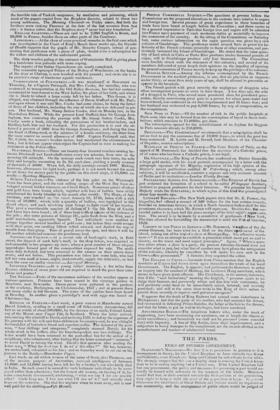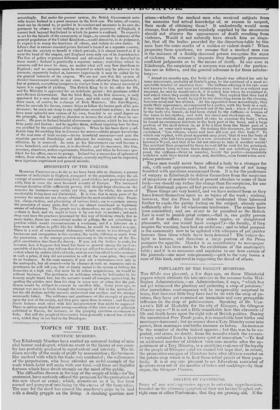EVILS OF DIVIDED GOVERNMENT.
THE PRESS.
BLACKWOOD'S MAGAZINE—We fear it is as pernicious in practice as it is incongruous in theory, for the United Kingdom to have virtually two Kings and Cabinets, even though one Ring anil Cabinet be subordinate to the other. We strongly suspect that this as a mighty share in causing the United King- dom to be in reality anything but a United one Utile United Kingdom had but one government, the policy and measures fcr governiug a part would na- turally be framed with reference to the interests of the whole. Ministers would feel that, in their conduct towards the Irish portion of the population, they ought to keep in sight the good of the imputation at large. la general discussion the inhabitants of Great Britain and Ireland would be regarded as one community, and the management of public affairs would be judged of accordingly. But under the present system, the British Government natu- rally leaves Ireland in a great measure to the Irish one. The latter, of course, must not be dictated to, or guided in its conduct and measures in its own de- partment by others ; it has nothing to do with the governing of England; it cannot look beyond that Ireland to which its power is confined. To expect it to act for the benefit of the community at large—to consult the interests of the general population of the United Kingdom—would almost be, in its judgment, to expect it to usurp the functions of others, and violate its own duties. it follows that in various essential points Ireldnd is treated as a separate country, and from the anxiety to benefit it which prevails, it is almost treated as if it were the head of the empire, and England were only one of its dependencies. The line of policy at present followed and advocated may be described in these words : Ireland is practically a separate nation; everything which its interests call for must be done, no matter what evil may flow therefrom to England ; and no measure must be resorted to which may be adverse to its interests, separately looked at, however imperiously it may be called for by the general interests of the empire. We are not sure that this system of divided Government could, in any case, operate otherwise than injuriously ; but at present, everything conspires to extract from it the utmost measure of injury it is capable of yielding. The British King ho:ds his office for life, and his Ministry is appointed for an indefinite period ; this produces settled and efficient Government. But the Irish King, in the first instance, is only appointed for a very short term of years, and with every change of King, there must, of course, be a change of Irish Ministers. His Sub-Majesty, when he ascends his throne, cannot deign to follow the beaten path of his pre- decessor; he must not stoop to any inglorious second-hand matters; he must have some splendid new system of his own, founded in no small degree on the principle, that he ought to abandon or reverse the work of those he suc- ceeds. He goes to Ireland brimful of erroneous opinions, which he has drawn from party and faction: and he applies them, without inquiring how far they are justified by the condition of his subjects. When he has been there a suf- ficient time for enabling him to discover his errors—obt:iin proper knowledge of the real state of Irish society—devise beneficial measures—and gain the requisite personal friendships and influence for rendering such measures effective, he is removed. As soon as his Government can well become a wise, beneficial, and stable one, it is dissolved ; and his successor, like him, reverses, abandons, makes experiments, blunders, and when he becomes qua- lified for his office, cea.es to govern. Ireland has a succession of ephemeral rulers, from whom, in the nature of things, scarcely anything can be expected, save injurious experiment and general misrule.






















 Previous page
Previous page